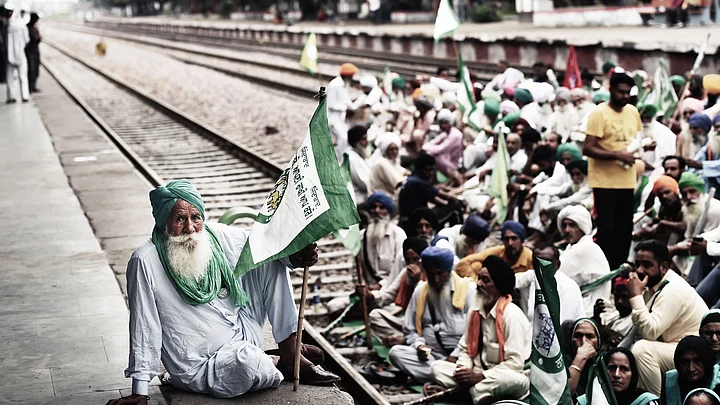On Gurpurab, Prime Minister Narendra Modi announced his government’s decision to repeal the three controversial farm laws. The move is aimed at neutralising the impact of farmers' protests in Punjab and Uttar Pradesh (UP), which go to polls next year.
Bharatiya Janata Party (BJP) strategists hope the repeal would assuage a section of farmers, led by the Jat community, to make a ‘gharwapsi’ (homecoming), thus providing a fillip to the party’s prospects, especially in Western Uttar Pradesh.
Jats had overwhelmingly backed the BJP in the 2017 state and 2019 general elections, with 43% / 91% voting for the saffron party. All the 13 Jat MLAs in the current Assembly are from the BJP.
With the rise in prominence of farmer Jat leader Rakesh Tikait, who has close links with the Rashtriya Lok Dal (RLD), a majority of Jats have been rallying around Ajit Singh’s son Jayant Chaudhary for the 2022 election. RLD is likely to have a tie-up with Akhilesh Yadav’s Samajwadi Party (SP) in Uttar Pradesh.
The JAM Strategy
The SP is focusing on expanding its traditional Yadav/Ahir-Muslim (AM) vote bank by including Jats (J) disillusioned with the BJP due to the farm laws in its fold. The JAM influences 170-180 seats, 80-odd seats where the minority population is more than 33%, 50-60 seats in the Yadav belt, and 70 seats in the Jat belt (after cancelling the common seats).
Chaudhary Charan Singh (Jayant’s grandfather) , followed by Mahendra Singh Tikait (Rakesh’s father), had successfully built a Jat-Muslim Ekta in the region with both voting together and playing the role of kingmakers in western Uttar Pradesh.
However, opportunistic hopping by Ajit Singh from the UPA to the NDA and back sowed seeds of mistrust among Muslims. The Muzaffarnagar riots of 2013 damaged the relations between the two communities severely.
Rakesh and Jayant have been attempting to revive this social coalition and achieved some success, as evidenced during the Muzaffarnagar mahapanchayat. However, there are still sections among both communities that have reached a point of no return.
The rollback of farm bills may convince a section of Jats to kiss and make up with the BJP.
The Disenchanted Brahmin
A section of Brahmins has been reportedly unhappy with the BJP government. Brahmins and Rajputs are traditional rivals among upper castes and have had tiffs for supremacy. With a Thakur at the helm, a section of Brahmins has been unhappy.
All the major opposition parties have been holding sammelans (gatherings) to woo the Brahmins. UP has the highest upper caste population (20%) among big states in India, and to defeat the BJP, a division in this segment is crucial.
With SP emerging as the main contender to the BJP and the momentum it is gaining in the opinion polls, a section of disillusioned Brahmins was open to exploring the option of backing it.
However, this decision to repeal the farm laws has the potential – theoretically – of making a dent in the Jat vote bank of SP-RLD, thus damaging its prospects. It would force a section willing to switch to rethink and thus negate whatever traction SP was getting amongst the Brahmins.
The Western UP & Lakhimpur Battlefield
The Jats, though only 2% of the population of Uttar Pradesh, are concentrated in Western Uttar Pradesh, accounting for 16%-18% of the population. The Khariboli, Kannauj, and Braj sun-regions, where Jats have influence, account for 71 seats. BJP had won 51 seats in 2017, SP 16, Congress two, BSP one, and RLD one.
The minority population in Western Uttar Pradesh is 26%, higher than the state average of 19%. In eight districts of Saharanpur, Muzaffarnagar, Bijnor, Moradabad, Rampur, Jyotiba Phule Nagar, Meerut, and Bareilly, the minority population is around 40%. In six of these districts, the Jat population is also substantial and it’s here the SP-RLD alliance hopes to make inroads.
Lakhimpur, where four farmers were mowed down allegedly by the vehicle of Union Minister Ajay Mishra’s son, also falls in this region. Tensions are palpable here and there is resentment against the BJP amongst the affected Sikh community and the farmers, which the SP-RLD alliance could exploit.
Caste Arithmetic is Still Important
The Yadav population is less in western Uttar Pradesh, which complicates matters for the SP. Here, Dalits are also in sizeable numbers, and the absence of any alliance with the BSP means the gains made in 2019 could be squandered.
Jatavs are still backing Mayawati. Jats and Muslims don’t share the same bonhomie as earlier. The alleged involvement of a Brahmin in the Lakhimpur incident also neutralises the efforts of the SP to woo the community.
As per Crowdwisdom360, the average of opinion polls predicts a close contest in Uttar Pradesh, with 198 seats for the BJP and 157 for the SP.
A Fluid State
Encouraged by Modi’s climbdown, the farmers’ union have hardened their stance and are now demanding a guarantee of MSP for their produce and compensation to the 700-plus farmers who died during the protest. Just a repeal may not be enough.
The farmers' protest is far from over on this front. The proceedings in Parliament over the repeal of the laws will also be crucial. Things are in a very fluid state currently.
However, farmers’ protests and their repeal may not be the only major factor affecting voting patterns in Uttar Pradesh, even amongst the worst-affected western region. A complex interplay of caste and religion, bonhomie and antagonism among voting groups, contradictions within social coalitions of parties could determine the course of elections.
(The author is an independent political commentator and can be reached at @politicalbaaba. This is an opinion piece. The views expressed above are the author’s own. The Quint neither endorses nor is responsible for them.)
(At The Quint, we question everything. Play an active role in shaping our journalism by becoming a member today.)
